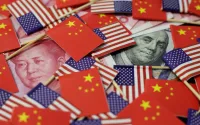Common Dreams / Published on Sunday, August 15, 2004 by the Observer/UK
If John Kerry wins the US presidency, he will find himself in the same plight as Lyndon Johnson and Richard Nixon when they took office. Each inherited another man's war. Each prosecuted that war, Johnson reluctantly, Nixon because he thought he could do better. Both failed and were destroyed by the war.
Johnson dreaded that this would happen. He told his press secretary, Bill Moyers: 'I feel like a hitchhiker caught in a hailstorm on a Texas highway. I can't run. I can't hide. And I can't make it stop.'
The murdered Kennedy's foreign policy advisers told him that if he didn't press on with the war, 'Asian communism' would conquer one non-Western state after another - dominos tumbling. So did practically everyone else in the Washington policy community. It was one of those things 'everybody knew'.
Johnson was a populist economic and racial-justice reformer. He knew nothing of south-east Asia. He knew that if he prosecuted the war, he 'would lose everything at home'. If he did not, he 'would be seen as a coward and my nation would be seen as an appeaser, and we would both find it impossible to accomplish anything for anybody anywhere'. Kerry expresses no such doubts. He apparently accepts what 'everyone knows' in Washington today, as in London, that 'failure in Iraq is not an option'.
This is true. Failure is no longer an option because it has already been assured by choices already made by the Bush administration. The questions that remain are failure's timing and the gravity of its consequences. The principal purpose of the invasion was to turn Iraq into Washington's strategic anchor in the Middle East, with permanent US military bases there and an assured American role in its economy and oil industry.
The countries that previously played this strategic role were the Shah's government in Iran during the 1960s and 1970s and Saudi Arabia following the Gulf War. They provide inauspicious precedents. The Shah's government was overturned by the same nationalist and religious forces that motivate the Iraq insurrection today. The identical forces, at work within elite groups in Saudi Arabia, were responsible for Osama bin Laden's creation of al-Qaeda.
John Kerry supported the invasion of Iraq. He says that he still does. His reproach to George W Bush is that he, Kerry, could have done it better. He would have won the support of all the allies and of the international community. If elected, he promises to 'put a deal together' with those allies that would allow 'a significant, enormous reduction' of US troops in Iraq by the end of his first term, that is, by four years from now.
Subsequently realizing that this is not quite what the electorate wants to hear, he promised to withdraw troops within a year, a correction undermining the plausibility of both promises, contributing to his difficulty in clarifying where he actually stands.
None the less, he seems confident that if he is President, other countries will send troops to fight the insurgency, replacing Americans. He does not explain why they should wish to do so. Last week, Polish and Ukrainian authorities noted that their troops, engaged by militants of Muqtada al-Sadr's Mahdi army, had been sent to Iraq as peacekeepers, not to fight, and that their existing commitments will soon be up.
When Nixon campaigned for the presidency in 1968, during the Vietnam war, he said, like Kerry, that he knew how to win. His plan was to emulate Dwight Eisenhower, whose Vice-President Nixon had been during the war in Korea. He would threaten nuclear war. When Eisenhower took office in January 1953, he caused a message to be conveyed to Beijing and Pyongyang, warning that he would 'carry on the war in new ways never yet tried in Korea'. In July, an armistice was agreed, effectively partitioning Korea along the 38th parallel, as it remains today.
When Nixon became President in 1969, the notion of atomic attack on North Vietnam had already been bruited in limited Washington circles, but judged an unprofitable option. He none the less transmitted a threat of 'massive retaliation' to Hanoi, to no effect. He subsequently ordered bombing attacks that eventually became the heaviest campaign of conventional aerial bombing in the history of warfare. The Vietnamese communists were unmoved.
The Vietnam war ended with an ignominious American withdrawal, following an agreement with Hanoi signed in 1973. Two-and-a-half years after that, Saigon fell to communist forces, with American officials scrambling on to helicopters from the embassy rooftop.
Nixon, however, had possessed an option in 1969 that he lacked the courage to choose. He had always said he admired Charles de Gaulle. De Gaulle, when returned to power in 1958, at a moment of extreme crisis in France's war to defeat Algerian insurgents and to keep Algeria French, recognized that the war was futile, even if the insurrection itself might temporarily be defeated.
He cut France's losses. Defying military mutiny, despite significant resistance from French public opinion, and facing assassination attempts and a terrorist campaign directed against him and his government, de Gaulle negotiated Algerian independence. It was an act of cold-blooded courage and realism.
It did not leave France revealed as 'a pitiful, helpless giant', as Nixon said would be the case if the United States left Vietnam. It strengthened France, freeing it to deal with the real issues of political and economic reform. If John Kerry is elected President, he will have the de Gaulle option. He will have a window lasting a few months during which he could reverse US policy and expect, provisionally, to carry public opinion with him.
Kerry could set a general timetable for coalition troop withdrawals, begin them, terminate the construction of permanent American bases now going on and reaffirm respect for Iraq's sovereign authority over its national economy, its industry and the disposition of its energy resources.
He could offer new support and urge international engagement in new efforts by the traditional religious and tribal leadership and existing political forces to re-establish the representative political institutions that existed in Iraq between independence in 1932 and the series of military and Baath party coups that began in 1958.
The conventional wisdom in Washington and London is that political disorder and communal struggle would actually follow, leading to chaos, Iraq becoming 'a breeding ground for terrorism'. Once again, this is irrelevant. Iraq already is a breeding ground for terrorism and is nearing chaos under the occupation.
It is obvious that continued military occupation worsens the situation: it provokes resistance and disorder. In any case, the ultimate responsibility for what happens in Iraq lies with the Iraqis, if they are let alone. This is what they have insistently been saying all along.
The intervention in Iraq is the latest in a 50-year series of American politico-military interventions into the internal affairs of non-Western countries, none of which has been a success. Most were failures. The consequence of failure in Vietnam unseated the Johnson and Nixon administrations. Revolution in Iran and defeat in Lebanon in 1983 seriously damaged the Carter and Reagan administrations. This year, Iraq may defeat George W Bush.
Why should John Kerry wish to be next? But on present evidence, this is likely to become the case.
William Pfaff is the author of several books on American foreign policy, most recently Fear, Anger and Failure: A Chronicle of the Bush Administration's War against Terror






